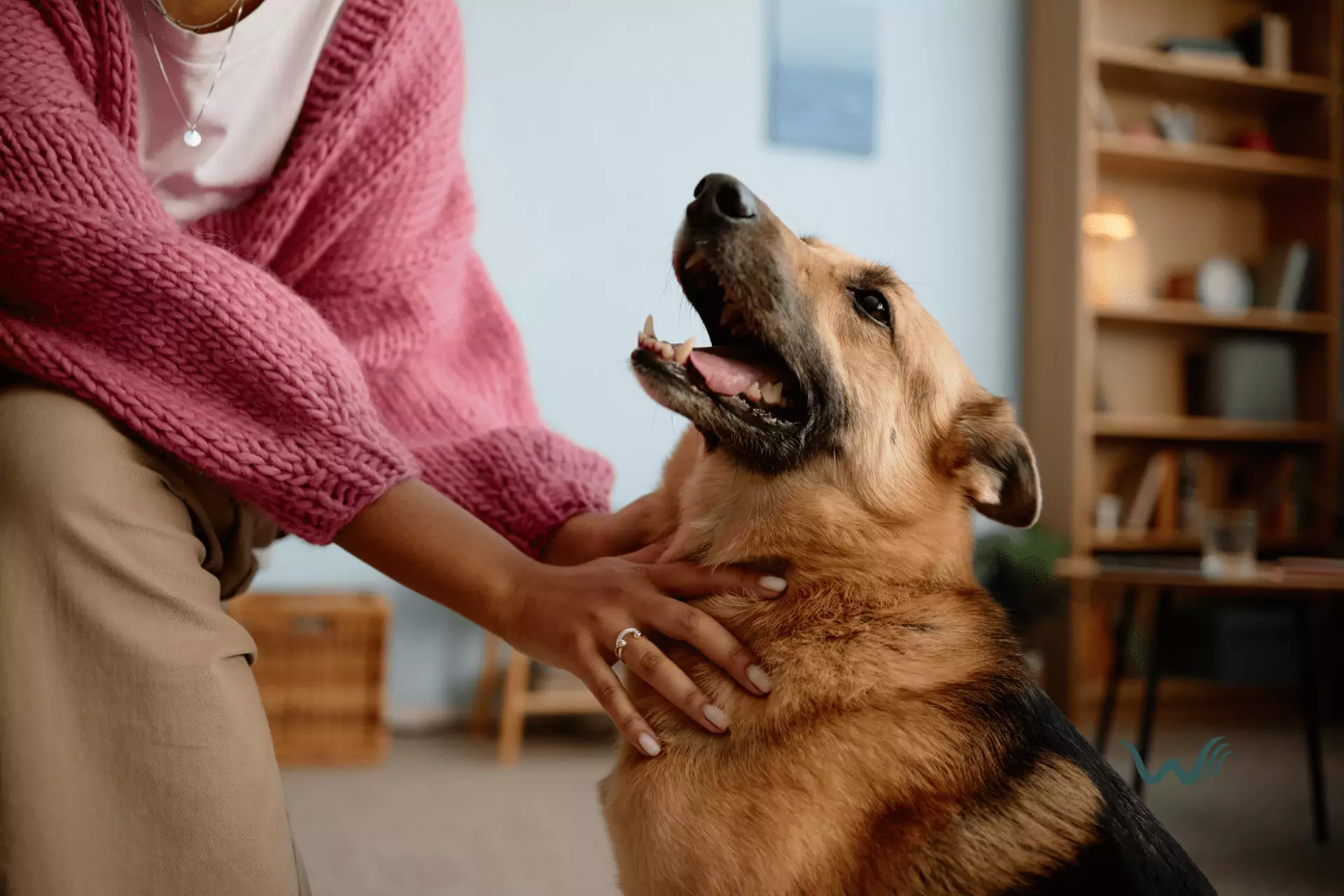

Discover the 7 Best Emotional Support Dog Breeds for Anxiety and Depression
by Nimra Shakil
Last updated: March 27, 2025
Verified and Approved by:
Angela Morris,
MSW, LCSW
Fact Checked

Living with anxiety and depression can feel overwhelming, but the right emotional support dog can provide comfort and stability. These loyal companions help ease stress, reduce feelings of loneliness, and bring a sense of calm to daily life. Some dog breeds are especially suited for this role because of their affectionate nature, intelligence, and ability to bond.
In this guide, we’ll explore the best emotional support dog breeds for anxiety and depression. Learn how they can create a meaningful impact on the mental well-being of their owners.
Understanding Emotional Support Dogs
Emotional support dogs help improve mental well-being. They provide comfort and companionship to people with anxiety and depression. Unlike service animals, they do not perform specific tasks. Instead, they offer emotional stability through their presence.
These dogs can sense distress and offer love and support without conditions. They help reduce the weight of mental health struggles, making daily life easier.
The Purpose of Emotional Support Dogs
An emotional support dog offers substantial psychological benefits to individuals with mental or emotional disorders without needing specialized training. Their simple presence enhances the lives of their owners by offering companionship and reassurance. This support is critical for individuals suffering from conditions like anxiety and depression.
The Role of Emotional Support Animals
These animals play a crucial role in the management of mental health conditions. Emotional support animals give us love and companionship without conditions. They help mitigate anxiety, provide comfort during depressive episodes, and generally improve the quality of life for their owners.
Differences from Service and Therapy Dogs
Emotional support dogs are different from service and therapy dogs. Service dogs undergo training to assist individuals with physical disabilities. They usually perform tasks like guiding the blind or alerting the deaf. Service dogs for anxiety help people struggling with mental health.
Therapy dogs, on the other hand, provide comfort and joy in settings such as hospitals or schools. However, emotional support dogs do not require any special training. Their main role is to provide emotional stability to their owners through their companionship.
Legal Recognition
Various laws recognize these dogs to ensure they can live with their owners without typical pet restrictions. This recognition includes permission to reside in no-pet housing under the Fair Housing Act in the United States.
By understanding emotional support dogs, we can appreciate their significant impact on the lives of those they help. They provide a lot of benefits like reducing stress and anxiety. This makes them valued by those needing mental support and stability.
Benefits of Emotional Support Dogs
Emotional support dogs offer significant benefits to individuals with mental health conditions, particularly those experiencing anxiety and depression. These special animals provide more than just companionship. They also bring numerous psychological and physical health benefits which can improve the quality of life for their owners.
Reducing Anxiety and Depression
Emotional support dogs have a calming effect on their owners. Their presence can help lower blood pressure, reduce stress levels, and decrease feelings of anxiety. These dogs can help individuals suffering from anxiety, depression or post traumatic stress disorder. They can provide a sense of safety and immediate emotional relief, often distracting them from overwhelming thoughts.
Physical Activity and Health
Having an emotional support dog encourages physical activity. Regular walks and playtime with the dog can increase serotonin and dopamine levels. Serotonin and dopamine are natural mood stabilizers that play a crucial role in combating depression. This increase in physical activity not only helps in reducing symptoms of depression but also promotes overall physical health.
Emotional Stability and Companionship
Emotional support dogs provide crucial affection and assistance. This is essential for those with mental health conditions. These dogs provide a constant, reliable presence that can be particularly comforting during times of emotional instability. They help their owners develop a routine, which can bring structure to their daily lives.
Role in Managing Health Conditions
Emotional support dogs can also play a role in managing other health conditions worsened by anxiety. These conditions can be panic attacks or post-traumatic stress disorder (PTSD). Their ability to recognize signs of distress and provide comfort can prevent or lessen the severity of these attacks.
Legal Protections and Accommodations
Under the Americans with Disabilities Act (ADA) and the Fair Housing Act, emotional support dogs are recognized. This allows them to have special accommodations. Owners can live in places that usually do not allow pets without paying extra fees. This helps ensure they get the support they need from their pets.
Impact on Daily Life
The impact of emotional support dogs extends beyond immediate emotional relief. They also help foster social interactions and reduce feelings of isolation. Owners often find it easier to engage in social settings with their dogs. It can lead to improved social relationships and reduced feelings of loneliness.
Enhanced Training Benefits
Emotional support dogs naturally offer great benefits. However, additional training can further improve these benefits, especially for managing depression symptoms. If you’re interested in strengthening the bond and effectiveness of your emotional support animal, training can be helpful. For techniques of training emotional support dogs for depression, check out Guide to Training Emotional Support Animals for Depression
Key Traits of Effective Emotional Support Dogs
Choosing the right emotional support dog is crucial for those dealing with anxiety and depression. The best emotional support dogs have special traits. These traits help them provide comfort and improve mental health.
Ideal Temperament for Anxiety and Depression
A key trait in emotional support dogs is a calm and gentle temperament. Dogs that help with anxiety or depression should be inherently peaceful, approachable, and patient. This temperament ensures that they can handle sudden mood changes and stressful situations. They could do it without becoming overly excited or anxious themselves.
Intelligence and Trainability
Emotional support dogs need to be smart and easy to train. This is especially true when they need to perform tasks to help during panic attacks or anxiety. Dogs that are easy to train can more effectively perform tasks that help during anxiety or panic attacks. This makes them excellent psychiatric service dogs as well.
Sociability and Sensitivity
Emotional support dogs should be highly sociable and sensitive to their owner’s emotional state. They need to provide comfort without being overwhelming, particularly during times of stress or depression. Their ability to sense and respond to their owner’s needs is crucial for offering timely support.
Physical and Emotional Accessibility
Accessibility is an important factor to think about. The dog should be manageable size and energy levels to fit the lifestyle of the owner. For individuals with limited space, smaller breeds might be more practical. While those who can accommodate more activity might benefit from a larger dog.
Legal Recognition and Support
Emotional support dogs are recognized under the Americans with Disabilities Act and the Fair Housing Act. Laws legally support their presence to assist individuals with disabilities. They are not only pets but also vital support systems.
For more information on how emotional support animals help with mental health, read about their role in managing depression.
Top 7 Best Emotional Support Dog Breeds for Anxiety and Depression
Emotional support dogs offer invaluable comfort and companionship, especially for individuals grappling with anxiety and depression. Certain dog breeds excel in providing this kind of emotional support. This is because of their natural temperament, intelligence, and affectionate nature. Here’s a detailed look at the top seven breeds known for their ability to ease anxiety and depression.
1. Labrador Retriever
Labrador Retrievers top the list as one of the best emotional support dog breeds for anxiety and depression. Their friendly and outgoing nature makes them perfect for this role. Labradors are loyal, can sense their owner’s mood and can provide comfort during stressful times. They are not only great companions but are also easy to train.

This makes a Labrador suitable as psychiatric service dogs. They are helpful for those suffering from mental health conditions like PTSD or severe anxiety.
2. Golden Retriever
Golden Retrievers are another breed that is highly regarded for emotional support. They share many qualities with Labradors, including intelligence and a gentle demeanor. Golden Retrievers are patient and often serve as therapy dogs in clinical settings. Their calm presence can help reduce blood pressure and stress levels.

3. Cavalier King Charles Spaniel
The Cavalier King Charles Spaniel is one of the best small dogs for emotional support. They are incredibly affectionate and thrive on forming strong bonds with their owners. This breed’s sensitivity to their owner’s emotions makes them excellent companions for those dealing with mood disorders. They are small enough to be manageable but have a hearty temperament, ready to offer comfort anytime and anywhere.

4. Poodle
Poodles are highly intelligent and easily trainable, which makes them excellent emotional support animals. They come in various sizes, which is beneficial for matching them to different living situations. Poodles have hypoallergenic coats, which is a plus for those with allergies. Their keen sensitivity to their owners’ emotions makes them particularly adept at providing support during anxiety and depressive episodes.

5. Bichon Frise
Bichon Frises are known for their cheerful dispositions and ability to get along with almost anyone. They are playful, affectionate and a source of comfort for those experiencing anxiety and depression. Bichons are also small and easy to care for, requiring regular but manageable grooming.

6. Shih Tzu
Shih Tzus are another small breed that excels as emotional support dogs. They particularly suit apartment living and have a loving and friendly nature. Shih Tzus form strong attachments to their owners. They can provide a significant amount of emotional support through their constant presence and affectionate behavior.

7. French Bulldog
French Bulldogs have a calm demeanor but are also alert enough to provide significant emotional comfort. They are sturdy, dependable, and adapt well to various environments, making them suitable for city living. Their charming personality and loving nature make them excellent companions for those needing emotional support.

Each of these breeds brings unique qualities. They can help alleviate the symptoms of anxiety and depression, making them excellent choices for emotional support dogs.
How Emotional Support Dogs Help with Mental Health Challenges
Emotional support dogs do more than provide comfort. They become part of their owner’s daily routine, helping with anxiety, depression, and stress. Their presence creates stability and encourages healthy habits.
Providing Emotional Balance
Emotional support dogs help their owners regulate emotions throughout the day. When anxiety spikes, their presence offers immediate relief. Simple actions like petting a dog or feeling their steady breathing can lower blood pressure and ease tension.
Encouraging Social Interaction
Many people with anxiety and depression struggle with isolation. Emotional support dogs help break that cycle. Whether on a walk or at a pet-friendly café, they create opportunities for interaction. Dogs can help owners have small interactions like someone asking about the dog breed. This can help build confidence and reduce stress and anxiety in social settings.
Creating Structure and Routine
A routine is essential for managing mental health conditions. Emotional support dogs keep their owners on a schedule. Feeding, grooming, and walking times create a sense of responsibility. This structure helps individuals struggling with post-traumatic stress disorder (PTSD) or depression stay engaged in daily life.
Offering Nighttime Comfort
Sleep disturbances are common in those with anxiety and depression. Emotional support dogs provide reassurance at night. Their presence can reduce panic attacks and create a feeling of safety, leading to more restful sleep.
Emotional support dogs are more than companions. they actively help their owners manage mental health in everyday situations. By offering stability, encouraging interaction, and promoting routine, they improve overall well-being.
Comparing Size: Small vs. Large Emotional Support Dogs
Choosing between a small or large emotional support dog depends on your space, lifestyle, and personal needs. Both have advantages, but the right fit varies for each person.
Advantages of Small Emotional Support Dogs
Small emotional support dogs are ideal for apartments and city living. They are easy to carry, travel well, and require less food and exercise. Many small breeds, like the Cavalier King Charles Spaniel, are affectionate and love being close to their owners. However, small dogs can be fragile and may bark more, which might not suit every home.
Benefits of a Larger Emotional Support Dog
Large dogs offer a strong physical presence and a deep sense of security. Many provide deep pressure therapy, which helps with panic attacks and stress relief.
Breeds like the Golden Retriever and Labrador Retriever are calm, loyal, and intuitive. However, they need more space, eat more, and may cost more in vet care. Some landlords also have pet size restrictions.
Legal Protection for Emotional Support Dogs
Housing restrictions should not be a barrier. With an ESA letter, landlords must allow emotional support animals, even in no-pet housing. This is crucial as having an ESA Letter Can Help With Depression.
Selecting Your Ideal Emotional Support Dog
Selecting the best emotional support dog depends on your lifestyle, home, and personal needs. The right dog breed should match your daily routine and emotional support requirements.
Living Space and Accommodation
Selecting the best dog breed also depend upon your living space which can be a small apartment or a house with a yard. Best small dogs for emotional support, like the Cavalier King Charles Spaniel, adapt well to compact spaces. Larger breeds, such as Labrador Retrievers, need more room and daily outdoor exercise. Choose a dog that fits your living environment.
Grooming and Allergies
Some dogs shed less, making them better for allergy sufferers. Poodles and Bichon Frises are hypo-allergenic, reducing allergy risks. Long-haired breeds need frequent grooming, so consider the time and cost of maintenance. If you have allergies, a low-shedding breed is the best option.
Time and Energy Commitment
All emotional support dogs need care, but some require more attention. Active breeds, like Golden Retrievers, need daily walks and playtime. Low-energy dogs, such as Shih Tzus, only require short walks and indoor relaxation. Be honest about how much time and energy you can provide.
Training and Behavior
Easy-to-train breeds adjust better to routines and emotional support tasks. Labrador Retrievers and Poodles learn quickly, making them ideal for stress and anxiety relief. Some small dogs can be stubborn, requiring extra patience. If you prefer a well-behaved companion, select a highly trainable breed.
The best emotional support animal ESA suits your lifestyle, space, and energy levels. Choosing the right emotional support dog ensures a better experience for both the owner and the pet. Understanding how an ESA provides comfort and stability can help when choosing the right emotional support animal for depression.
Embracing the Journey with Your Emotional Support Companion
Finding the best emotional support dog for anxiety and depression is a personal decision. The right dog offers companionship, reduces stress, and brings emotional stability. Some people need therapy dogs for anxiety, while others prefer smaller breeds for apartment living.
These dogs help regulate emotions and create a sense of routine. They provide comfort during difficult moments. From Labrador Retrievers to Cavalier King Charles Spaniels, each breed has unique qualities that support mental well-being.
Beyond choosing the right dog breed, legal protections matter. Laws like the Americans with Disabilities Act (ADA) and the Fair Housing Act let ESA owners live with their dogs. This is true even in places that do not allow pets.
If you’re considering an ESA, getting the proper documentation is essential. Wellness Wag provides expert guidance and resources to help individuals obtain an ESA letter. This ensures they get the support they need for a healthier and more balanced life.
Certify Your Emotional Support Animal Today

Why You Can Rely on Us?
At Wellness Wag, we believe your pet deserves care rooted in both science and compassion. Each article is carefully researched, written in clear language for pet owners, and then reviewed by qualified professionals to ensure the information is evidence-based, current, and practical for real-life care. Our goal is to help you feel confident in making informed decisions about your pet’s health and well-being.
Reviewed by
Angela Morris, MSW, LCSW
Angela is a licensed clinical social worker with 20 years of experience in patient advocacy and community mental health. She has assisted numerous clients with ESA evaluations and brings a deep understanding of disability accommodations, ensuring that all information is accurate, supportive, and practical.

Written by :
Nimra Shakil
Last Updated :
March 27, 2025











